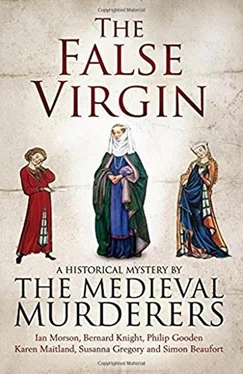There were signs of agreement from the listeners round the table. The high-voiced young man was nodding his head in a sage sort of way. The tall fellow was perhaps not so convinced, since he merely raised his eyebrows before moving off. Satisfied, Geoffrey picked up his pint pot and returned to his seat. He knew not to press home his advantage. Leave the group to mull over the idea he’d planted in their heads. He had succeeded in his principal aim, which was to quieten the fiery man in the red cap. Geoffrey shifted his attention back to the pilgrims at the far end of the room. Two or three individuals more had joined since he last looked, including the tall man. Out of the corner of his eye he observed the group at the neighbouring table as it broke up until the only one left was the speaker. When he’d finished his drink he too got up to leave. On the way out he paused by Chaucer’s seat.
‘It is I who am right, my friend . John of Gaunt is a changeling, and not what he seems. Just as the house where he lives is a front for all manner of corruption and iniquity, and full of foreign filth. You say you have sources inside the Savoy Palace. Well, so do I, I tell you.’
Chaucer kept his face impassive at these last words, the only unexpected thing the man had uttered. This lack of response provoked him further. He leaned in slightly and said: ‘The day will come when all the fine folk within Savoy walls will tremble at the wrath of the common people. The day will come when that white house is reduced to a pile of grey ash.’
This was very dangerous and foolish talk. Geoffrey was losing patience but he still did not respond, simply staring calmly at the man. Finally, realising he wasn’t getting anywhere, the red-cap stalked out of the Tabard with a curious, stiff gait. Chaucer finished his own drink, giving the other time to go a distance, and then, after promising Harry Bailey that he’d try the Rhenish on his next visit, he made for the door. Standing in his way was the tall individual who had listened in on the earlier conversation.
‘A dragon and a mermaid! Ha! I would rather have said that John of Lancaster was the offspring of Mars and Venus.’
Geoffrey had to look up at the speaker, who was more than a head taller. His face was battered and scarred but he wore an amused look.
‘The child of Mars and Venus? That would turn Lancaster into Cupid, wouldn’t it?’ said Geoffrey, struggling to envisage Gaunt as a plump, mischievous child with a quiverful of arrows slung over his shoulder. Well, yes, he might have been like that once. The other man must have come to the same conclusion for he too smiled.
‘You were having trouble over there?’ said the man, nodding his head towards the place that Geoffrey had just left. ‘I saw that insolent person trying to bait you. I almost came across to give him a piece of… my mind.’
Geoffrey shrugged. A brawl was exactly what he had been trying to avoid. He recognised the man in front of him, recognised not who he was but rather what he was. While they were talking he’d been running his eyes over the other’s clothing. Like his face it was battered but of sound quality. His tunic, of thick fustian, was patterned with a network that looked like rust. It was the imprint of the chain mail he had been wearing. That, together with his assured voice and manner, was enough to tell Geoffrey that here was-
‘Sir Edward Jupe, at your service,’ said the man, thrusting his hand forward.
They shook hands. Geoffrey introduced himself. Sir Edward scratched his head as if he might have heard the name. Geoffrey asked if he was going to join the pilgrimage since the knight seemed to be part of the group assembling in the Tabard. Also he was aware that fighting men of Jupe’s rank often went on a pilgrimage after campaigning, either as a way of giving thanks for their survival or perhaps because they simply couldn’t settle down.
‘No, Master Chaucer, there is no pilgrimage for me. I am acquainted with a couple of the gentlemen who are on their way to Canterbury, that’s all,’ said the knight, glancing towards the company. ‘I have delayed here a moment to greet my friends. My destination is much closer. I have not seen my lady for these many months.’
And so, thought Chaucer, you show your eagerness by visiting her with your tunic unchanged and rust-spotted. It occurred to him that the marks might equally well be blood. Still, that was what some ladies liked in their men, newly returned from the wars. He didn’t ask where Sir Edward had been campaigning. There was always a war going on somewhere.
‘I hope you find her well… but not too well.’
‘What do you mean?’ said Sir Edward, an angry look replacing the previous good humour. ‘What do you mean, sir?’
‘Only that your lady must surely be feeling the absence of her knight, and that your return will restore her to perfect health. Nothing more than that.’
‘Ah, just so. If you’ll forgive me,’ said the knight, bowing before making to withdraw towards the group of pilgrims. Chaucer at last was permitted to quit the Tabard, and to reflect on his two meetings. The encounter with the red-capped man had not been pleasant but he knew that what the agitator said was not so different from what many Londoners believed, even if few would dare to say it out loud. John of Gaunt was unpopular not merely on account of his fabulous wealth and because he had been unsuccessful in various recent military adventures, but because he had married a foreign queen, Constance of Castile. He was thought to be over-mighty, arrogant and devious. There was some truth in all of these accusations.
Geoffrey Chaucer was pleased with his quick invention in the Tabard Inn. The claim that Gaunt was the product of a dragon and a mermaid had a kind of poetic truth to it. After all, what was Edward III in his younger campaigning days but a dragon heaping fire and destruction on his enemies? And Queen Philippa, dead these last seven years, had been in her young days a notable beauty: like a siren, like a mermaid. Thinking these things, Geoffrey felt the sheaf of papers inside his coat. The story of Beornwyn.
Once he had called at his Aldgate lodgings and visited the scribe by St Paul’s church and handed him the sheets with instructions to make three copies, Geoffrey Chaucer proceeded westwards towards the Savoy. He intended to visit his wife and children. The morning was warm and bright, and the streets crowded. He thought of the pilgrims about to set off from Southwark, and half envied them their ride away from the smoke and smell of the city. It took him about half an hour to reach the area of the palace. The Strand was paved until this point and then the paving gave up, as if the thoroughfare was not interested in anyone who wanted to travel beyond the Savoy.
The section facing the street gave little idea of the beauty and splendour that lay within. A long, fortified wall prevented passers-by from seeing or even guessing at anything of the interior. In the middle of the wall was an enormous gateway, secured by a portcullis. Since this was only raised for ceremonial entrances and exits, the usual way in was via a pedestrian gate – itself by no means small – a few yards away from the principal one. This gate was not kept closed, because there was so much traffic in and out, but a couple of liveried members of the household kept a discreet watch on everyone.
As he was approaching this entrance, Geoffrey was surprised to see someone who looked like the irate man from the Tabard Inn walking ahead of him. And even more surprised when red-cap turned into the Savoy gate. Any doubt about his identity was dispelled when he cast a quick look behind him as he entered. Chaucer ducked his head just in time. He noticed that the man was not intercepted by the gatekeepers, which suggested that they knew him. He recalled what the man had said about having his own sources inside the Savoy. Perhaps he was speaking the truth.
Читать дальше












